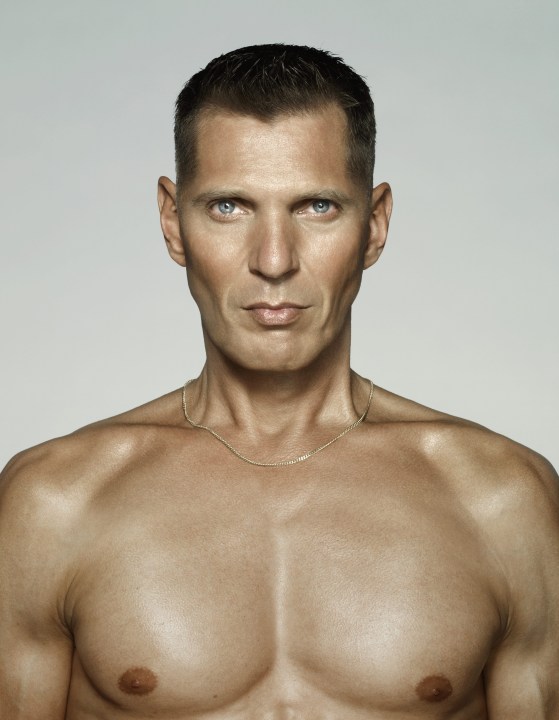Hamiltons is pleased to present Erwin Olaf: Bigger Than Life, a celebration of Olaf’s life and photographic oeuvre. The exhibition presents important works from across the artist’s four-decade career, including works from series such as Chessmen, Im Wald, Palm Springs, Paradise and Grief, alongside a selection of self-portraits. It is a monumental celebration of the artist’s contribution to the visual arts, and of his long-term close friendship with Hamiltons Gallery.
Erwin Olaf passed away in 2023. In one of the artist’s last conversations with Shirley den Hartog, his right hand and studio manager, he said that he wished to be remembered as ‘bigger than life’. This show pays homage to this wish.
During his lifetime Olaf was internationally renowned as an artist whose diverse practice centred around society’s marginalized individuals including women, people of colour, and the LGBTQ+ community. In 2019, following the acquisition of 500 works by in the Rijksmuseum, Olaf became a Knight of the Order of the Lion of the Netherlands. On the occasion Taco Dibbits, the director of the Rijksmuseum, called Olaf “one of the most important photographers of the final quarter of the 20th century”. In Autumn 2025, the Stedelijk Museum will be unveiling a major retrospective of Olaf’s works, hailing him “a free-thinker, and a tireless advocate for equal rights and freedom of expression.”
The walls are adorned from almost floor to ceiling with Olaf’s works, spanning across years and photographic series. The magnitude of the show is a metaphor for the magnitude of Olaf’s legacy; an ode to Erwin Olaf as ‘bigger than life’.
Influenced by artists such as Robert Mapplethorpe and Helmut Newton, Olaf’s early works were marked by a distinct subverting of social norms, challenging of taboos, and exploration of sexuality in modern society. Olaf started his career while living in a squat in Amsterdam by documenting 1980’s nightlife, but soon explored his own series and subjects in both black-and-white and colour. As his career progressed, he began shooting surrealist tableaux style images, adopting the role of both director and photographer, opting for a cinematic style embedded with stillness which seeks to express the sitter’s genuine emotions and neuroses.
Olaf’s highly theatrical mise-en-scenes recall the early ’60s, underscored by a diluted colour palette. He seeks inspiration from this period of major social changes, the rise of feminism, a prospering middle-class, globalisation and the haunting influence of television in nouveau-riche American households. Influenced also by his own travels and accompanying feelings of transience and anomie, Olaf’s models often gaze into the distance and evoke an uneasy, disconnected sense of mystery. Their cinematic nature reflects Olaf’s evolution as an artist, leaning towards more complex narratives.
The exhibition presents a wide-ranging spectrum of the many issues that Olaf addressed in his work. His series ‘Im Wald’ (2020), which translates to ‘In the Forest’, draws attention to several global issues, including the climate crisis, wanderlust, migration and the COVID19 pandemic; directly investigating nature’s impact on our lives. Works from his series ‘Skin Deep’ (2015) explore the theme of the nude body; Olaf strived to challenge the beholder to perceive more clearly our contemporary notions of skin and sensation, of beauty and the body, without prejudice. These images stand as his refutation of the overwhelming saturation of sex and desire inherent in our modern mass-market, mass-media society. Meanwhile, works from Berlin (2012), Shanghai (2017) and Palm Springs (2018) explore the changing developments and cultures of three different cities, guiding the viewer to reckon with contemporary challenges faced in the context of societal histories, be that the tension between rapid cultural expansion and deep-rooted traditions in Chinese communities, or LGBTQ+ rights, racial injustice and gender inequality in American society.
Erwin Olaf was driven by the power of storytelling and the emotion images can provoke. He overcame initial controversy through sheer mastery of the medium, solidifying himself as one of the most important visual artists to emerge from Holland. On his death, the Dutch royal family issued a statement mourning the nation’s loss of “a unique, exceptionally talented photographer and a great artist”. His legacy is a momentous body of work which challenged societal norms and continually asked the question first posed to him by his photography tutor: “What is normal?”
ARTIST BIO
Erwin Olaf was born in Hilversum in the Netherlands in 1959. He was first recognised internationally in 1988 after winning the Young European Photographer of the Year Award for his series ‘Chessmen’.
Olaf’s bold approach to photography earned him commissions from Louis Vuitton, Vogue, and the Rijksmuseum amongst many others. In addition to many international awards over the course of his career, his work is held in many private and public collections internationally including, amongst others, the Rijksmuseum in Amsterdam, the Fonds National d’Art Contemporain in Paris, the Museum Ludwig in Cologne, the Pushkin Museum in Moscow or the Art Progressive Collection in the United States. Olaf has been subject of solo exhibitions at Kunsthalle München, Germany; the Suwon Museum of Art, Suwon, Korea; National Taiwan Museum of Fine Arts, Taichung City, Taiwan and Centro Cultural De La Villa, Madrid, Spain.
In March 2023 Majesty the King Willem-Alexander and Her Majesty Queen Máxima of The Netherlands presented Erwin Olaf with the Medal of Honor for Art and Science from the House Order of Orange at Noordeinde Palace in The Hague. Erwin Olaf passed away in 2023 in Leide, The Netherlands.

